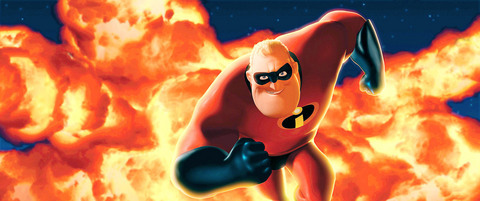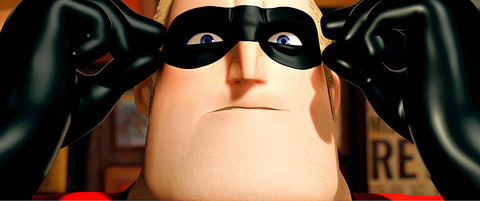1. BEFORE SUNSET/SIDEWAYS: Superb writing and acting, unobtrusive but expert direction and, above all, unflagging intelligence made these two observant, romantic misadventures the best films of the year. Imagine that working; Hollywood usually doesn't.
2. CONTROL ROOM: In the flood of political documentaries, this was the only one that encouraged us to question messages from all sides, including whichever side we like to believe. ... And, crucially, to suspect parts of "Control Room" itself. Neither Michael Moore nor Bill O'Reilly will ever understand that kind of honesty, the rest of us need to.

PHOTOS COURTESY OF WARNER MOIVES
3. BAD EDUCATION/KINSEY/THE MOTHER: In this red state nightmare trifecta, badly behaving gays, sex researchers with murky motives and a granny who refuses to be a proper bereaved widow powerfully proved that to deny desire is to undervalue one's own, and everybody else's, humanity. And if these ingenious films are any indication, being naughty can also lead to great art.

4. I (HEART) HUCKABEES: The search for spiritual peace in our corrupt modern world is funny, people! Or can be, if it doesn't leave you too traumatized. Just like we all do when we seek to know what it's all about, Davd Russell's one-of-a-kind riff on life's great cosmic joke danced on the edge of profundity and inanity. Only more gracefully.
5. DOGVILLE/THE FIVE OBSTRUCTIONS: Lars von Trier is Europe's most provocative mad movie scientist. These two films -- a three-hour, bare-stage critique of provincialism and power (with Nicole Kidman's best-ever film performance), and a playfully sadistic "making of" documentary like no other -- broke down everything we take for granted at the movies, then built their own unique forms out of the rubble.
6. MILLION DOLLAR BABY: Clint Eastwood delivers another masterpiece. This is not news anymore. Oh, it's a lady boxer movie. Well, that's, uh, unexpected. It also contains Clint's best acting and directing work to date. And it's an unparalleled example of lighting and tonal control. OK, then; media duly alerted.
7. THE BLIND SWORDSMAN (ZATOICHI)/HOUSE OF FLYING DAGGERS/KILL BILL -- VOL. 2: Martial-arts movies got taken in all kinds of imaginative directions this year by Japanese (Takeshi Kitano), Chinese (Zhang Yimou) and American (Quentin Tarantino) directors with limited experience in the genre. It showed, beautifully, in an exhilarating explosion of new ideas and broken tired rules.
8. RAY: Jamie Foxx's channeling of soul legend Charles was nothing short of phenomenal, but the presentation of music, cultural history and the blind genius' understandably darker qualities made for a rocking movie that never missed a high note -- and man, were there plenty of them.
9. GOOD BYE LENIN!/NOTRE MUSIQUE: One thing that we should acknowledge Europeans know: No matter how much the world progresses, man's propensity for self-delusion and violence will always prevent paradise on Earth. Two totally different filmmakers, young German ironist Wolfgang Becker and grizzled French New Waver Jean-Luc Godard, got to the core of this matter with a post-communist family comedy and a hyper-aestheticized philosophical essay. The real connection? Both films still have hope.
10. THE INCREDIBLES: The first big, computer-animated feature that expressed its director's personal worldview, Brad Bird's superhero satire was also faster, funnier and more visually distinctive than anything the still-young format has seen before. Fight mediocrity, heck yeah!

By 1971, heroin and opium use among US troops fighting in Vietnam had reached epidemic proportions, with 42 percent of American servicemen saying they’d tried opioids at least once and around 20 percent claiming some level of addiction, according to the US Department of Defense. Though heroin use by US troops has been little discussed in the context of Taiwan, these and other drugs — produced in part by rogue Chinese Nationalist Party (KMT) armies then in Thailand and Myanmar — also spread to US military bases on the island, where soldiers were often stoned or high. American military policeman

Under pressure, President William Lai (賴清德) has enacted his first cabinet reshuffle. Whether it will be enough to staunch the bleeding remains to be seen. Cabinet members in the Executive Yuan almost always end up as sacrificial lambs, especially those appointed early in a president’s term. When presidents are under pressure, the cabinet is reshuffled. This is not unique to any party or president; this is the custom. This is the case in many democracies, especially parliamentary ones. In Taiwan, constitutionally the president presides over the heads of the five branches of government, each of which is confusingly translated as “president”

An attempt to promote friendship between Japan and countries in Africa has transformed into a xenophobic row about migration after inaccurate media reports suggested the scheme would lead to a “flood of immigrants.” The controversy erupted after the Japan International Cooperation Agency, or JICA, said this month it had designated four Japanese cities as “Africa hometowns” for partner countries in Africa: Mozambique, Nigeria, Ghana and Tanzania. The program, announced at the end of an international conference on African development in Yokohama, will involve personnel exchanges and events to foster closer ties between the four regional Japanese cities — Imabari, Kisarazu, Sanjo and

Sept. 1 to Sept. 7 In 1899, Kozaburo Hirai became the first documented Japanese to wed a Taiwanese under colonial rule. The soldier was partly motivated by the government’s policy of assimilating the Taiwanese population through intermarriage. While his friends and family disapproved and even mocked him, the marriage endured. By 1930, when his story appeared in Tales of Virtuous Deeds in Taiwan, Hirai had settled in his wife’s rural Changhua hometown, farming the land and integrating into local society. Similarly, Aiko Fujii, who married into the prominent Wufeng Lin Family (霧峰林家) in 1927, quickly learned Hoklo (commonly known as Taiwanese) and